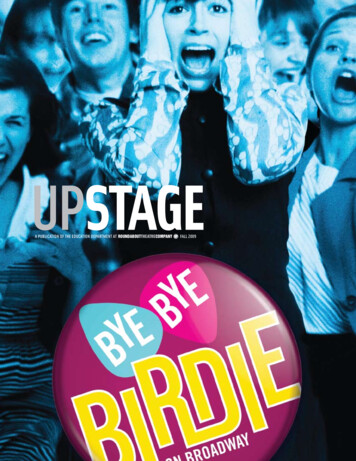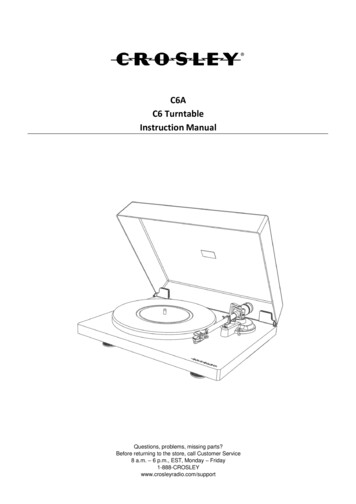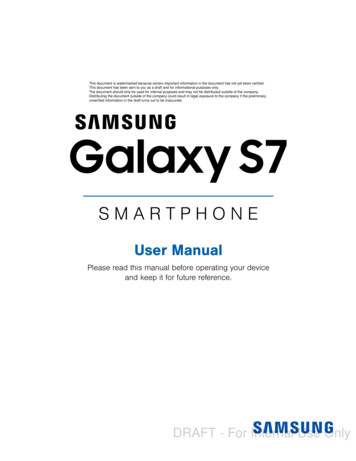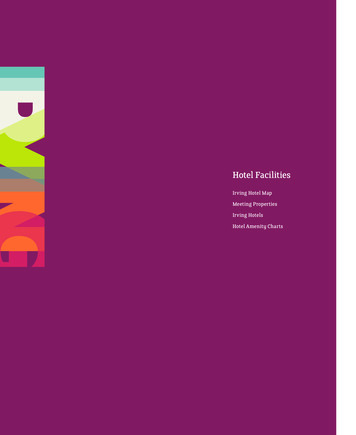
Transcription
UPSTAGEA Publication of the Education Department at RoundaboutTheatreCompanyUPFALL 2009UPSTAGE FALL 2009 Bye Bye Birdie 1
How do we define ourselves?Interview with the Actor: Nolan FunkInterview with Director: Robert LongbottomThe World of the PlayInterview with the Composer: Charles StrouseInterview with the Lyricist: Lee AdamsInterview with the Costume Designer: Gregg TRECOMPANYPage 4Page 6Page 8Page 10Page 12Page 14Page 16Page 18Page 19
We love you,Conrad!4Oh, yes we do!We love you, Conrad!And we’ll be true6When you’re notnear us, we’re blue!Oh, Conrad,8we love you!1012141819upstage CONTRIBUTORS: Greg McCaslin Education Director; Jennifer DiBella Associate Education Director; Jay GerlachEducation Associate for Theatre Programs; Aliza Greenberg Education Program Associate; Ted Sod Education Dramaturg;Nicole Bournas-Ney Education Intern; John Istel Contributor; LaTonya Borsay Contributor. COVER: Artwork for the RoundaboutTheatre Company production of BYE BYE BIRDIE Copyright 2009 Roundabout Theatre Company, Inc. All rights reserved.ROUNDABOUTTHEATRECOMPANY 231 West 39th Street, Suite 1200, New York, NY 10018 Telephone: 212.719.9393Fax: 212.869.8817 www.roundabouttheatre.org.
Interview withthe Actor: Nolan FunkUPSTAGE sat down with our very own Conrad Birdie, Nolan Funk, to discuss his roleas the teenage heartthrob.What is your take so far on the character of Birdie?He’s someone who has been given a gift, and he’s comefrom somewhat of a shady past. But through talentand appeal, he’s been able to surpass the circumstanceshe was born into and now he’s become this great star.There’s a lot of humor in the part, but I want him to bea real human being. I don’t want to lose the element offun in him or get too heavy about it, but I want him tobe a whole person. The challenge in playing this role isyou want to retain his likeability. The role really teeterson the brink of unlikeability and it’s a hard balance toplay. I think he initially started out his career with theattitude: “Well, I don’t have that much to lose, becauseI don’t have that much anyway.” It’s even referenced inthe play—they found him in reform school. Then, Rosiecalls him a car thief. That’s why he was able to swivel hiships more than the other guys on television and maybescream a little harder. He has no social etiquette. Sothere is a kind of freedom to playing him. It’s certainlyrelatable to me in terms of my life, being highly unawareof certain social practices. I took this role not knowingthe musical. I just read the script like I was auditioningfor anything else. And I based my interpretation of whohe was on that.How do you feel about being on Broadway eighttimes a week?I’ve been on a mission to do a Broadway show. Iwant to do something live. As grateful as I am to haveplayed as many roles as I have in film and television,I’ve been trying to get on Broadway for a while. SinceI was a kid, I remember thinking, “I really want to dothis.” I grew up in Canada, but Les Miserables came totown, Phantom of the Opera, Joseph and the AmazingTechnicolor Dreamcoat. One of the first things I everwatched on television, if not the first thing, was a videorecording we had of Into the Woods with BernadettePeters. And I loved mythology and fairy tales growingup. I love going into something that I’m not an expertin. I understand that there’s a Broadway community, anaudience that will be looking at me with a more criticaleye than most performers have to deal with. I’m veryaware that I’m coming from Nickelodeon. They may notrealize that I’ve done a lot of other work. Maybe they’regoing to see me as this Nickelodeon kid who got the rolebecause the producers thought some teenage girls willwant to come and see him. That’s Birdie’s audience. Butit’s a limited run, it’s the Roundabout Theatre Company,one of the most prolific theatre companies with one of4ROUNDABOUTTHEATRECOMPANYthe highest subscription rates, and they don’t need meto sell tickets.Did you look at the movie, or do any research onit?I did a lot of research on the period. I watched someparts of the movie and some clips, but I saw what theoriginal guy had done and it didn’t feel like what Iwanted to do with it. I just had a different take.In this video clip, “Bye, Bye Birdie” director Robert(Bobby) Longbottom: says something like, “We’rereexamining this role for a new generation.” Whatdo you think he means by that?What he means is that in the original cast of theBroadway production as well as in the movie, the actorplaying Birdie was a lot older than me—I’m 22. Onething I love about Bobby’s approach is that everythingcomes from an acting standpoint. I can’t tell you howcreatively fulfilling and gratifying it’s already been. I doknow that there is sincerity to the way I want to playBirdie. Even though there’s part of him that’s reallypissed off, there is still that love of music. When Birdiegets up there and sings, it’s coming from his gut. Everymolecule in his body has got to be in it. For him toappeal to the audience as he does, it’s got to be morethan just having a catchy song and being attractive. Iwant to make “Honestly Sincere” have so much pent-upfeeling that we can understand why it would have beenthe No. 1 song in America for six months. I want to playBirdie with a raw quality.In previous productions, the joke of “HonestlySincere” was that he isn’t sincere. But you’resaying you have to see how committed he is toperforming.It’s totally a different take on it. I know that the wayI’m choosing to take on this role is risky. But I’m allabout taking on a challenge. It’s maybe because Iread the script the way that I did, not bringing anypreconceptions to it. I can only speak as the type ofartist I am, but personally, I keep coming back to: Thisis a living, breathing, emotional human being. Theonly way to do that is exploring Birdie’s back story, sothat I’m not out there saying empty lines. I want toknow everything about him. I don’t know what kindof choices ultimately will be made and what they’regoing to let me get away with, but there are really somekey things that he says. Obviously he is someone whois singing about sizzling steaks and shiny Cadillacs,
things that he didn’t really know, and now he’s gottento a place where he can afford them. He’s been so busyand wrapped up in touring and the life of being a starthat he’s trying to escape and finally enjoy those things.Ultimately, I think Birdie is a mask, but he’s a talentedmask.You’ve got a background in gymnastics—will youget to use any of that in this part?You know, we talked about it, and in Spectacular! Idid a flip and things like that. But I’m kind of steeringaway from that, because I don’t think it makes sense forBirdie.Here are some internet clips from Spectacular! ofyou dancing. Where did you learn to dance?My father actually dances the tango and I grewup always loving to dance. But doing a movie likeSpectacular! was an education. I don’t have a lot offormal dance training. Again, it’s the character—I don’twant Birdie to move like he’s been on Broadway all hislife. He has this innate feeling, this spark inside of himthat gets him to move. I don’t want him to seem slickand sleazy. I don’t want him to feel polished. I want himto seem raw and genuine and greatly flawed.In some of the press about you, they’re alwayscalling you “the next Zac Efron.” Is that flatteringor annoying or both?It really doesn’t bother me at all. I’m my own type ofartist, and I’m quite particular and independent in mythinking, and I’m not trying to brand myself as Zac perse. But it’s fun. Why wouldn’t I want to be compared tosuch a popular actor? I was not the popular kid in highschool, so if you want to compare me to the popularpeople, go ahead. UPUPSTAGE FALL 2009 Bye Bye Birdie 5
Interview withthe Director: Robert LongbottomUPSTAGE recently spoke with Bye Bye Birdie Director-Choreographer RobertLongbottom about the challenges of reviving this iconic musical for the first timeon Broadway.Why did you want to direct Bye, Bye Birdie?Because it’s never been revived on Broadway. Thereare very few shows that can make that claim. Everyoneseems to have performed in Bye, Bye Birdie, either inhigh school or in community theater or college. It wasthe portal through which a lot of people fell in love withmusicals. No one else has done it but Gower Champion,and aside from the movie, people don’t really rememberthat production, which is always good for a directorbecause I get to reinvent it.Is there anything Gower did that you are aware ofbeing an influence for you, or is this going to be acomplete departure?Any director-choreographer who has had a hand inshaping a musical—which clearly Gower did—has hisDNA is all over it, so you never really remove that nordo you want to. But in terms of those iconic numbers—“The Telephone Hour,” “Put on a Happy Face” —I neversaw the original. I am going to make it my own withoutdeparting from the story and the intention of the scene.Do you feel like you are working on a family show?Yes and no. I think I’m working on something that’s notjust for families, but for people in general. It’s a goodtime and its altogether without irony, and there’s littleof that to be found anymore on Broadway. We put theexperience of going to musical comedy in italics, andeverything is sort of taken with a ‘wink, wink’ to theaudience. Bye Bye Birdie takes itself seriously, as oneof the better numbers in the first act, Conrad Birdie’s“Honestly Sincere,” says. - You really have to play theshow straight ahead and not make fun of these people’svalues. My inspiration for this production was Disneyand Kodak’s installation at the World’s Fair in 1964,called the Carousel of Progress. It was a time whenAmericans and the world at large were truly optimisticabout what could happen, where we could go, whatlife could be like. And all the fear we have now aboutobvious things just didn’t exist. It’s a fantasy to imaginewhat it would have been like to live in that time and I’mhoping to capture that for everybody.Do you feel the show is about the Generation Gap?The great parent-child divide of adolescence hasn’tchanged. It grows wider if anything. And I think that’swhy the piece is relevant. Everybody goes through aperiod where you antagonize or infuriate your parents,and it helps identify who you are. Whether it’s whatyou do to your bedroom or what’s inside your locker,6ROUNDABOUTTHEATRECOMPANYthere’s that defiance that you need to become you, andI think that’s a pivotal moment for everybody. You canalso look to Conrad Birdie as an American Idol type. Ido think Conrad came up from somewhere—he’s avery unsuspecting kid who this happened to, a kid withsome trouble about him. He’s not a golden boy—he’s introuble with the law, in trouble with women, probablywith drugs. He had some issues, and I think when hesings “I’ve Got A Lot of Livin’ To Do,” it’s not that he’sready for an evening out. I think he’s actually askinghimself, “What’s happened to my adolescence? I’ve justbecome this thing that people trot around and bring outfor signings. And where’s my life?”How did you prepare to direct and choreographthis show? Will you talk about your process?I’m leery of artists who talk about their process. I don’tknow that I have a process— I just sort of do it. I jumpinto it and I do it. Either my instincts lead me down theright path or they don’t. I can usually see somethingfully formed in my head before I start to go at it. Butin terms of research, I put my hands on a lot of 1960’sfamily things, like the early Tupperware campaigns, likethe Carousel of Progress, the World’s Fair, the very earlydays of Disney and Epcot and their space installmentsand attractions. There was just something very sincereand genuine about it. There’s a time when that crossedover into camp, and this was long before that. I knewI wanted to be true to the period, and I knew I wantedto find a way to create a very stylish show that couldhave been at the World’s Fair. I just keep coming backto the Carousel of Progress because I just love howthat represented the American family. It was going toimprove everything about home and the family. Thetechnology was going to allow the toaster to work fasterso mom could have more time with you. I think all thatstuff was, and is, very sweet.What were you looking for when you cast the adultand the teen ensembles?I knew I wanted real people. I wanted genuine children.When this first appeared on Broadway, I’m sure therewas a lot of the teen chorus who were 26 and 27 yearold, very talented men and women, but they wereplaying teenagers. I knew that wouldn’t fly today. Weneed to get real kids with braces and pimples and allthose issues, and I didn’t want a lot of young peoplewho had been in a dozen Broadway shows. I didn’t wantthat jaded quality, which is there whether you like it ornot. So freshness was the word of the day. I think the
real deal. He’s not someone pretending to be anothericon. We are creating our own resume, if you will, forthis Conrad Birdie.I want to talk to you a little about the movie andTV versions. Were they of any use to you or didyou just ignore them?I looked at each of them, but I left them then. I thinkit was important to go, “Ok, this was that person’s takeon this, and it was valid at the time, but I’m not doingthat, and I don’t want to borrow things from that.” Theexception is the song Bye Bye Birdie, which was writtenfor the movie— Ann Margret opened the movie withit, and it’s such a great song. When I first asked about it,I wasn’t even sure that Strouse and Adams had writtenit. They had, in fact, and it’s a dandy little tune, so we’reusing it at the end of the show for our finale. That’s theone thing that we took from the movie.same thing applied to the parents—I wanted one ofevery sort of look and color we could possibly get ourhands on to make that neighborhood, that community,not just a WASP, white, sanitized
the musical. I just read the script like I was auditioning for anything else. And I based my interpretation of who he was on that. how do you feel about being on Broadway eight times a week? I’ve been on a mission to do a Broadway show. I want to do something live. As grateful as I am to have played as many roles as I have in film and television, I’ve been trying to get on Broadway for a .











